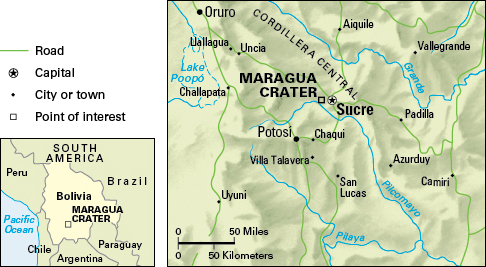Current Events Lesson Plan: August 4-17, 2016
Current Event: Really Big Feet
Recently, a Bolivian tour guide discovered an enormous dinosaur footprint that has been preserved for about 70 million years. At about 45 inches (115 centimeters) wide, the footprint is the largest carnivorous (meat-eating) dinosaur footprint ever discovered. The previous record was a 40-inch (110-centimeter) wide track from New Mexico, a state in the southwestern United States. The animal that made the South American print probably belonged to a group of dinosaurs called abelisaurids, large meat-eaters with short skulls and tiny arms, that lived in South America, Africa, and India. Based on the enormous size of the footprint, scientists think the dinosaur could have been up to 40 feet (12 meters) long. The discovery of this footprint helps paleontologists fill in the history of large meat-eating dinosaurs in South America.

The record-setting dinosaur footprint was found in Maragua Crater just outside Sucre, Bolivia. Credit: WORLD BOOK map
Objective:
Dinosaurs are a group of prehistoric reptiles that ruled Earth for about 160 million years. Dinosaurs lived during most of the Mesozoic Era. This period in Earth’s history lasted from about 251 million to 65 million years ago. These animals died out millions of years ago, but they have fascinated people ever since they were first described in the early 1800′s. The name dinosaur comes from the term Dinosauria, which means terribly great lizards. But dinosaurs were not lizards, only distantly related to them, and most were not very terrible. Some dinosaurs towered above and weighed more than any other animal ever to live on land. Many of these large dinosaurs were fierce and deadly meat-eaters. The smallest kinds of dinosaurs were approximately the size of a chicken. Scientists learn about dinosaurs by studying their fossils, which include preserved dinosaur bones, teeth, eggs, nests, tracks, skin imprints, and waste material. The Behind the Headlines news story and related World Book articles explore dinosaurs and other prehistoric animals.
Words to know:
Discussion Topics:
1. Ask your students to name some types of dinosaurs. (Students might name the Apatosaurus (formerly called Brontosaurus), Brachiosaurus, Stegosaurus, Triceratops, Tyrannosaurus, Velociraptor.)
2. Ask your students what they know about South America, the place where the dinosaur footprint was found. (Students might say that Brazil is the largest country in South America in both area and population; the continent is home to the Amazon rain forest, the world’s largest tropical rain forest; the continent is part of Latin America; most of the continent has warm weather the year around; Aconcagua is the continent’s tallest mountain.)
3. Ask your student to debate: “If scientists were able to resurrect dinosaurs or other extinct animals by cloning or other methods, should they do it?”


